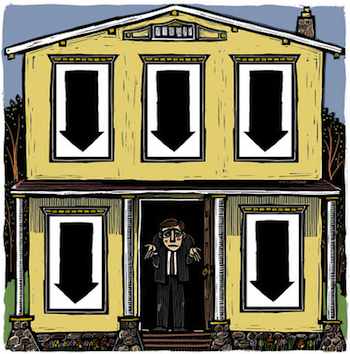- MENU
- HOME
- SEARCH
- WORLD
- MAIN
- AFRICA
- ASIA
- BALKANS
- EUROPE
- LATIN AMERICA
- MIDDLE EAST
- United Kingdom
- United States
- Argentina
- Australia
- Austria
- Benelux
- Brazil
- Canada
- China
- France
- Germany
- Greece
- Hungary
- India
- Indonesia
- Ireland
- Israel
- Italy
- Japan
- Korea
- Mexico
- New Zealand
- Pakistan
- Philippines
- Poland
- Russia
- South Africa
- Spain
- Taiwan
- Turkey
- USA
- BUSINESS
- WEALTH
- STOCKS
- TECH
- HEALTH
- LIFESTYLE
- ENTERTAINMENT
- SPORTS
- RSS
- iHaveNet.com
Ilyce Glink

I recently spoke to a group of real estate agents and mortgage lenders at an event in Woodstock, Ga. As folks sipped wine and nibbled on their snacks, we discussed how a rotten real estate market has changed so many of their clients' lives -- and not for the better.
One agent told how some California-based investors she worked with at the height of the housing bubble liquidated their 401(k) accounts, moved the money into self-directed IRAs, and invested all of it buying rental properties sight unseen in Atlanta -- properties that are now worth a fraction of what they spent.
Another agent shared the story of a buyer whose pastor instructed her to take out a second mortgage on her Chicago house and invest the money sight unseen (are you detecting a pattern here?) in rental property in Georgia. The homeowner has since lost not only the rental property but also her own home in Chicago.
A mortgage lender shared with me that she had two closings in the past couple of weeks in which sellers brought cash to the table in order to close. How much? One seller came to the table with
The lender remarked that most sellers she sees are simply walking away from their obligations and take the hit directly to their credit scores. "These folks didn't want their credit ruined," she added.
Among the many, one story stood out -- a Realtor who was earning hundreds of thousands of dollars in commissions a few years ago, bought a bunch of rental properties at the height of the boom, only to lose them all as his salary began to shrink. He is now rethinking his life, and retooling it to focus on what's most important.
All of these people are having to "right-size" their life. That's my term for people who face extraordinary financial pressures -- whether they lose a job, get a pay cut, get divorced, get sick, are widowed, or experience some other financial calamity -- and have to entirely change not only their finances but the way they cope with that financial shift in their lives.
It's not easy when one day you believe the world owes you a flat screen television set for every room of your house and the next day you realize you can't afford the
Financial pressures are the top reason couples divorce. Money (or lack thereof) is a top stress-inducing agent.
Today, the official rate of unemployment is at 10 percent, but the larger measure of unemployment is around 17 percent. Another large chuck of the population has seen their pay cut. Add it all up and you realize that perhaps as many as half of all Americans are facing some sort of minor to severe financial pressure.
It's a game-changer, or what the MBAs might call a "disruptive" event.
I've always believed that if you have a job, you'll make your mortgage payments, your credit card payments, your car loan, other debt payments, and maybe even put a little aside for your kids' college tuition.
If you don't have a job, your financial world will begin to crumple, as you lose your house, your car, your possessions and, perhaps, your family.
But coming to terms with your changing financial circumstances isn't easy. First you have to cope with the financial loss, and then you can begin to reset your dreams.
Related: Right-Sizing Your Finances